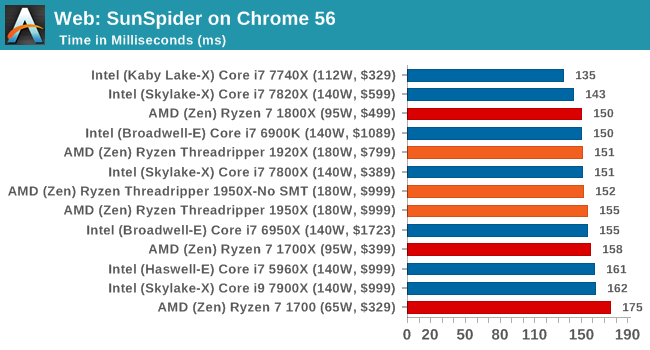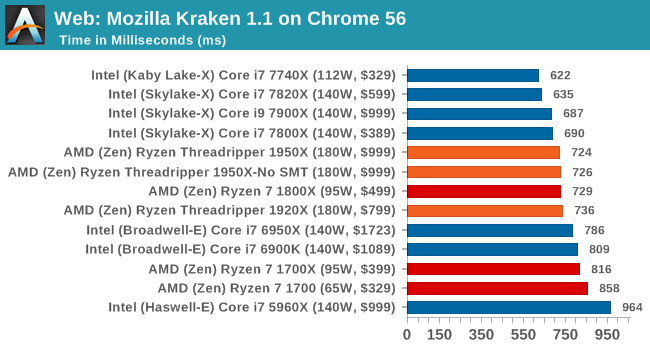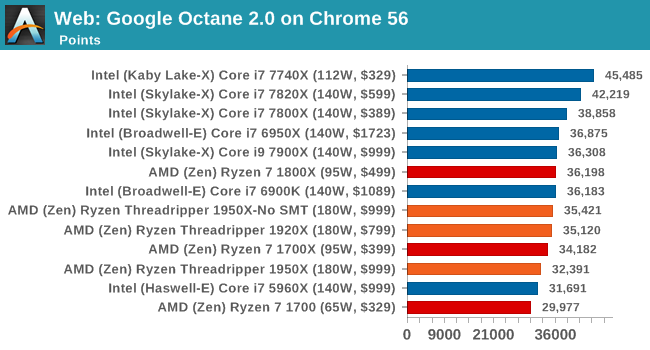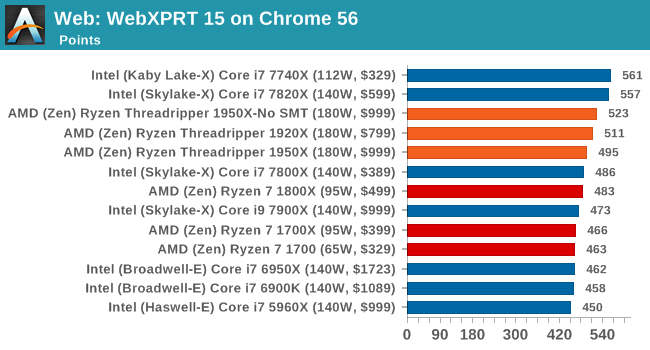The AMD Ryzen Threadripper 1950X and 1920X Review: CPUs on Steroids
by Ian Cutress on August 10, 2017 9:00 AM ESTCPU Web Tests
One of the issues when running web-based tests is the nature of modern browsers to automatically install updates. This means any sustained period of benchmarking will invariably fall foul of the 'it's updated beyond the state of comparison' rule, especially when browsers will update if you give them half a second to think about it. Despite this, we were able to find a series of commands to create an un-updatable version of Chrome 56 for our 2017 test suite. While this means we might not be on the bleeding edge of the latest browser, it makes the scores between CPUs comparable.
All of our benchmark results can also be found in our benchmark engine, Bench.
SunSpider 1.0.2: link
The oldest web-based benchmark in this portion of our test is SunSpider. This is a very basic javascript algorithm tool, and ends up being more a measure of IPC and latency than anything else, with most high-performance CPUs scoring around about the same. The basic test is looped 10 times and the average taken. We run the basic test 4 times.

Mozilla Kraken 1.1: link
Kraken is another Javascript based benchmark, using the same test harness as SunSpider, but focusing on more stringent real-world use cases and libraries, such as audio processing and image filters. Again, the basic test is looped ten times, and we run the basic test four times.

Google Octane 2.0: link
Along with Mozilla, as Google is a major browser developer, having peak JS performance is typically a critical asset when comparing against the other OS developers. In the same way that SunSpider is a very early JS benchmark, and Kraken is a bit newer, Octane aims to be more relevant to real workloads, especially in power constrained devices such as smartphones and tablets.

WebXPRT 2015: link
While the previous three benchmarks do calculations in the background and represent a score, WebXPRT is designed to be a better interpretation of visual workloads that a professional user might have, such as browser based applications, graphing, image editing, sort/analysis, scientific analysis and financial tools.

Overall, all of our web benchmarks show a similar trend. Very few web frameworks offer multi-threading – the browsers themselves are barely multi-threaded at times – so Threadripper's vast thread count is underutilized. What wins the day on the web are a handful of fast cores with high single-threaded performance.










347 Comments
View All Comments
goldgrenade - Thursday, January 4, 2018 - link
Idk, I use my 1920x for gaming and working, and... really everything. Second best CPU on the market with 1950x beating it out unless you can't get enough cooling.LOVE this CPU.
rauelius - Thursday, August 17, 2017 - link
I really want to build a 1920x1080 build.goku4liv - Saturday, August 19, 2017 - link
21/08/2017 INTEL LAUNCH 8 SERIES OF CPU................. AMD DEAD !!goldgrenade - Thursday, January 4, 2018 - link
HAHAHAHA xDHope you invested in AMD despite your comment. Looks like my gut instinct in buying AMD since 2009 was right. Intel chips have a security flaw, that when fixed for series 8 and 9 will remove approximately 30% of performance...
So who has the best chip now? Take 30% off any Intel benchmark against its then AMD rival and see which one would have been better.
Draven31 - Saturday, August 19, 2017 - link
NUMA appeared in Windows machines in 1998/1999 with the SGI Visual PC (which, yes, was a windows machine) and iirc, a workstation from Intergraph about the same time.halotron - Friday, March 16, 2018 - link
The benchmark Chromium Compile is excellent!Please do that for the next 2000-series of Ryzen/Threadripper as well.
Thanks